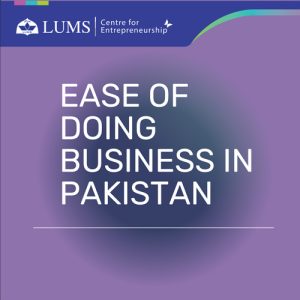
Ease of Doing Business
Written by Mahnoor Basit.
The term “ease of doing business” encompasses the simplicity and efficiency of processes involved in starting and operating businesses in a country. According to the World Bank’s 2023 ratings, Pakistan ranks 108th among 190 economies, reflecting both improvements and significant challenges. Despite having a population exceeding 220 million and a diverse economy, Pakistan’s business climate is impacted by political instability, high tariffs, and limited access to credit, which restrict growth and investment opportunities.
The regulatory framework for business registration in Pakistan requires multiple steps, including acquiring a National Tax Number (NTN) and registering with the Securities and Exchange Commission (SECP). Despite reforms such as online portals to streamline registration and one-stop shops for government interactions, many businesses remain part of the informal economy due to complex procedures and bureaucratic inefficiencies.
Comparatively, global best practices, such as Singapore’s fully digitised registration system and Estonia’s e-governance platforms, offer models for Pakistan to follow. The country has made progress in streamlining electricity connections, tax payments, and international trade processes, but challenges persist in accessing credit, obtaining construction permits, and ensuring regulatory transparency.
Pakistan’s business environment faces significant challenges related to social, cultural, and economic factors. Key issues include gender disparities, social inequalities, and informal networks, which exacerbate bureaucratic inefficiencies. Corruption remains a major barrier, with Pakistan ranked 133rd in the 2023 Corruption Perceptions Index.
Small and medium-sized enterprises (SMEs) struggle with access to finance due to complex tax systems, high collateral requirements, and outdated machinery, reducing their competitiveness. Government initiatives like subsidised loans and the SME Asaan Finance Scheme aim to support SMEs, but challenges remain, including limited access to credit and a lack of financial literacy among entrepreneurs.
Pakistan’s entrepreneurial ecosystem has seen growth, with incubators, accelerators, and funding opportunities becoming more available. However, barriers such as limited R&D investment, weak intellectual property rights (IPR) protections, and regulatory hurdles persist. Despite these challenges, Pakistan’s youthful population and emerging technologies offer opportunities for fostering innovation and entrepreneurship.
To improve the business environment, recommendations include streamlining regulatory processes, enhancing access to finance, improving infrastructure, and promoting skills development. Addressing these structural issues is essential to attracting investment, boosting economic growth, and enhancing Pakistan’s global competitiveness.
Read the full report for more insights and recommendations.

Comments are closed.